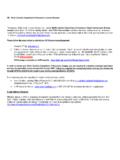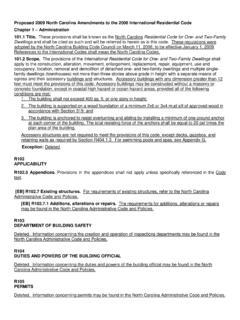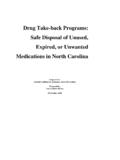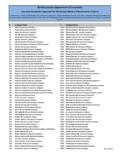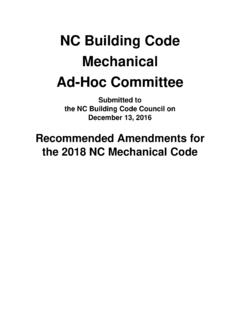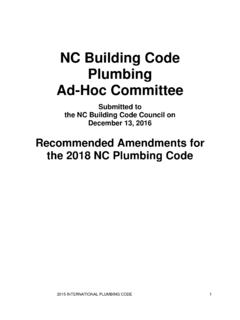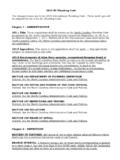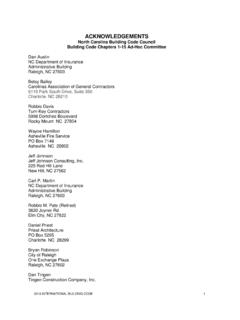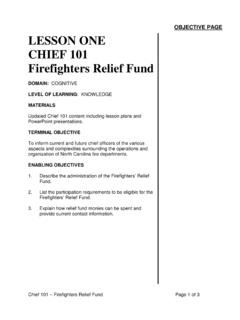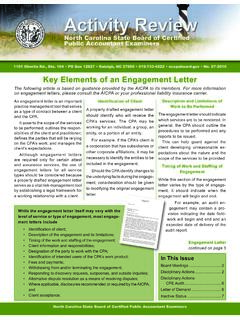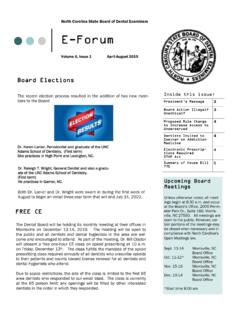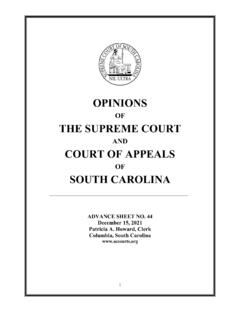Transcription of How do I become a certified… North Carolina Building …
1 Page 1 of 5 How do I become a North Carolina Building Code Inspector*? The NC Code Officials Qualifications Board (COQB) certifies qualified individuals to serve as code officials employed by local and state government. Staff provided by the NC Dept. of Insurance (NCDOI), Office of State Fire Marshal (OSFM) evaluate all applications and supporting documentation, determine eligibility to register for the state exam, and make recommendations for certification to the Board quarterly. The application process begins by creating a username and password online through the SYSTEM LOG-IN link on the OSFM web site unless you already have an ID number. Please contact the staff Customer Service Representative: Rodney Daughtry, via email at or phone (919) 647- 0027 with questions.
2 [NOTE: Also accessible through the NCDOI homepage , Office of State Fire Marshal dropdown selection, Engineering and Codes, Code Enforcement Officials (CEO) Certification Tools.] Individuals seeking certification must complete the application and provide sufficient documentation to support all education and experience claimed to meet the minimum requirements applicable to the Level of certification sought. All applicants must successfully complete the board s standard course for the level which they qualify by their education and experience as provided by Board Rule 11 NCAC All applicants must also successfully complete the board standard course in Law and Administration. This is a 15-hour course that is applicable to all levels of certification. The NC Community College System serves as the education sponsor for all standard courses.
3 Applicants must register for the standard course they plan to attend by contacting the specific community college education coordinator or instructor offering the course. A list of scheduled courses is available through the OSFM web site. Course credit is applied upon successful completion when the course roster is submitted. Occupancy Classification** Level I Level II Level III Assembly 1 story/ 7,500 sf 1 story/20,000 sf Unlimited Business 1 story/20,000 sf 1 story/60,000 sf Unlimited Multi-story: 4 stories max/20,000 sf per floor Education 1 story/ 7,500 sf 1 story/20,000 sf Unlimited Multi-story: 2 stories max/20,000 sf per floor Hazardous 1 story/ 3,000 sf 1 story/20,000 sf Unlimited Multi-story: 2 stories max/20,000 sf per floor Factory Industrial 1 story/20,000 sf 1 story/60,000 sf Unlimited Multi-story: 4 stories max/20,000 sf per floor Institutional 1 story/ 7,500 sf 1 story/10,000 sf Unlimited Multi-story: 3 stories max/10,000 sf per floor Mercantile 1 story/20,000 sf 1 story/60,000 sf Unlimited Multi-story.
4 4 stories max/20,000 sf per floor Residential Multi-unit 1 story/ 7,500 sf 3 stories max/no restriction on floor area Unlimited 1 & 2 family dwellings, townhouses Unlimited Unlimited Unlimited Storage 1 story/20,000 sf 1 story/60,000 sf Unlimited Multi-story: 4 stories max/20,000 sf per floor Utility and Miscellaneous Unlimited Unlimited Unlimited Page 2 of 5 * A Building Code Inspector typically takes an oath to perform duties as a Code Enforcement Official for a jurisdiction. ** See the Building Code for Occupancy classifications. 11 NCAC 08 .0706 REQUIRED QUALIFICATIONS: TYPES AND LEVELS (b) Whenever a provision of the Rules in this Section requires a supporting letter (maximum of two per level) from a supervisor, the letter(s) shall be notarized, shall state the supervisor's qualifications ( , what type and level of certificate or license the supervisor holds), shall state that the applicant has worked under the supervisor's direct supervision for a specified period of time, and shall recommend certification of the applicant as a specified type and level of inspector upon satisfaction of other required qualifications.
5 The supervisor shall describe the name, floor area, and number of stories of the buildings worked on by the applicant and shall describe the work performed by the applicant. (c) References in the rules in this Section to professional engineer or licensed engineer means engineers licensed by the North Carolina State Board of Examiners for Engineers and Surveyors pursuant to 89C. References in the rules in this Section to registered architect means architects licensed by the Board of Architecture pursuant to Chapter 83A of the North Carolina General Statutes. References to licensed Building , residential, electrical, heating, plumbing, and fire sprinkler contractors means contractors licensed by the State Licensing Board for General Contractors, the State Board of Examiners of Electrical Contractors, or the State Board of Examiners of Plumbing, Heating and Fire Sprinkler Contractors pursuant to Chapter 87 of the North Carolina General Statutes.
6 References to licensed " Building " contractors do not include licensed "residential" contractors. Specialty licenses issued by these occupational licensing boards are not acceptable. Applicants with licenses from other states or countries must provide a copy of their license and documentation that the requirements of the other state are at least equivalent to the statewide licensing requirements of North Carolina occupational licensing boards. (d) Whenever a provision of the rules in this Section requires the possession of an occupational license other than those certificates that are issued by the Board, if that license is inactive, the applicant must provide documentation from the appropriate occupational licensing board that the applicant previously held the license and that the license is currently inactive.
7 (e) Whenever a provision of the rules in this Section requires inspector experience on a minimum number of buildings or systems, the experience must include all the inspections typically performed by an inspector during construction of the Building or system. Inspections do not have to be performed on the same Building . (f) Whenever a provision of the rules in this Section requires a high school education or other education and experience qualifications, the Board may approve equivalent qualifications. Whenever a provision of the Rules in this Section requires the possession of a diploma or degree from an accredited college, university, or trade school, accredited shall mean accreditation from a regional accrediting association, for example, Southern Association of Colleges and Schools.
8 (g) Every applicant shall: (1) provide documentation that the applicant possesses a minimum of a high school education or a high school equivalency certificate ( GED); and (2) provide notarized certification by a city or county manager, clerk, or director of inspection department that the applicant will be performing "code enforcement", as defined in (a)(3), as an employee of that city or county; or provide certification by the head of the Engineering and Building Codes Division of the North Carolina Department of Insurance that the applicant will be performing "code enforcement", as defined in (a)(3), for a state department or agency; and (3) make a grade of at least 70 on courses developed by the Board. Successful completion is defined as attendance of a minimum of 80 percent of the hours taught and achieving a minimum score of 70 percent on the course exam.
9 All applicants must successfully complete a law and administration course. Applicants for certification in Building , electrical, fire prevention, mechanical, or plumbing inspection at levels I, II, or III must successfully complete a course in that area and level (or a higher level). For the purpose of entry into the state examination, courses must be completed within five years of the exam in Subparagraph (g)(4) of this Rule. These courses shall be administered and taught in the Community College System or other educational agencies accredited by a regional accrediting association; for example, Southern Association of Colleges and Schools; and (4) achieve a passing grade of 70 percent on the written examination administered by the Board in each level of certification unless exempt by 11 NCAC Page 3 of 5 (h) Building Inspector, Level I.
10 A standard certificate, Building inspector, Level I, shall be issued to any applicant who complies with Paragraphs (b) through (g) of this Rule and who provides documentation that the applicant possesses one of the following education and experience qualifications: (1) a one year diploma in Building construction from an accredited college or an equivalent apprenticeship or trade school program in Building construction; (2) a four-year degree from an accredited college or university; (3) at least six months of Building inspection experience with a probationary Level I Building inspection certificate on a minimum of two Level I buildings while working under the direct supervision of a standard certified Building inspector I, II, or III with a supporting letter from the applicant's supervisor which complies with Paragraph (b) of this Rule; (4) at least one year of Building design, construction, or inspection experience on a minimum of two Level I buildings while working under the direct supervision of a licensed engineer, registered architect, or licensed Building contractor with a supporting letter from the applicant's supervisor which complies with Paragraph (b) of this Rule; (5) a license as a Building contractor.
